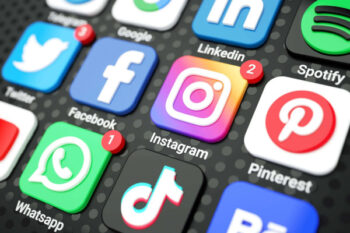Staff Writer for Wake Up World
Social media has become a ubiquitous part of our daily lives, allowing us to connect with others, stay informed, and share our experiences. While it has its benefits, there is growing concern about the negative impact of social media on our mental health. Research has shown that prolonged use of social media can lead to a range of negative emotions, including anxiety, depression, and loneliness. The constant barrage of information and stimuli can also make it difficult to switch off and relax, leading to a sense of mental overload and burnout.
So it’s high time we explore the darker side of social media and examine the latest research on its impact on our mental well-being. It’s important to understand how social comparison on social media affects our mental health, as well as the impact of sleep disruption caused by the blue light emitted by screens. But of course, social media can also be a wonderful thing – if you know how to use it in a healthy and responsible way, minimizing the risk of negative mental health effects. By understanding the potential risks of social media and taking steps to mitigate them, we can make the most of this powerful tool while safeguarding our mental health and well-being.
The Impact of Social Media on Mental Health
Numerous studies have linked social media use with mental health problems such as depression, anxiety, and loneliness [1]. One study found that heavy social media use was associated with increased feelings of social isolation [2], while another study found that people who spend more time on social media are more likely to experience symptoms of depression [3].
The constant barrage of curated images and perfect lives presented on social media can lead to unrealistic expectations and feelings of inadequacy, which can negatively impact our self-esteem and mental health [4]. In addition, the fear of missing out (FOMO) can also lead to anxiety and stress, as users constantly compare themselves to others and feel pressured to keep up [5].
The Role of Social Comparison
Social comparison theory suggests that we evaluate ourselves by comparing ourselves to others [6]. On social media, this often means comparing our lives to the highlight reels of others, leading to feelings of envy and dissatisfaction with our own lives [7]. This can be particularly damaging for young people, who are still developing their sense of self and are more likely to compare themselves to others [8].
[pro_ad_display_adzone id=”110030″]
In today’s digital age, social media has become an integral part of our lives, with millions of people using it on a daily basis to connect with others and share their experiences. While it has its advantages, there is growing concern about the negative impact of social media on our mental health, with studies suggesting that it can lead to feelings of anxiety, depression, and loneliness [1]. One of the main reasons for this is the phenomenon of social comparison theory, which suggests that we evaluate ourselves by comparing ourselves to others [6]. On social media, this often means comparing our lives to the highlight reels of others, which can lead to feelings of envy and dissatisfaction with our own lives [7]. This is particularly problematic for young people, who are still developing their sense of self and are more likely to compare themselves to others [8]. In this article, we’ll explore the dark side of social media and how it’s affecting our mental well-being. We’ll delve into the research on the negative impact of social media on mental health and the specific ways in which it can harm our well-being. We’ll also discuss some tips for using social media in a healthier way, so that we can all enjoy its benefits without sacrificing our mental health.
The Negative Effects of Social Media on Sleep
Another way social media can impact our mental health is through its effects on sleep. The blue light emitted by electronic devices can disrupt the production of melatonin, a hormone that regulates sleep [9]. This can lead to sleep problems such as insomnia, which is linked to numerous mental health problems, including depression and anxiety [10].
In addition, the constant stimulation of social media can make it difficult to wind down and relax before bed, further exacerbating sleep problems [11]. A lack of quality sleep can impact our mood, cognitive function, and overall well-being [12].
Conclusion
While social media has its benefits, it’s important to recognize the negative impact it can have on our mental health. The constant comparisons, FOMO, and lack of sleep associated with social media use can lead to feelings of isolation, depression, and anxiety. As with any aspect of our lives, moderation is key. By setting healthy boundaries and being mindful of our social media use, we can reduce the negative impact on our mental well-being.
References
[1] Woods, H. C., & Scott, H. (2016). #Sleepyteens: Social media use in adolescence is associated with poor sleep quality, anxiety, depression and low self-esteem. Journal of adolescence, 51, 41-49. https://pubmed.ncbi.nlm.nih.gov/27294324/
[2] Primack, B. A., Shensa, A., Escobar-Viera, C. G., Barrett, E. L., Sidani, J. E., Colditz, J. B., … & James, A. E. (2017). Use of multiple social media platforms and symptoms of depression and anxiety: A nationally-representative study among US young adults. Computers in Human Behavior, 69, 1-9. https://psycnet.apa.org/record/2017-05034-002
[3] Lin, L. Y., Sidani, J. E., Shensa, A., Radovic, A., Miller, E., Colditz, J. B., Primack, B. A. (2016). Association between social media use and depression among US young adults. Depression and anxiety, 33(4), 323-331. https://pubmed.ncbi.nlm.nih.gov/26783723/
[4] Vogel, E. A., Rose, J. P., Roberts, L. R., & Eckles, K. (2014). Social comparison, social media, and self-esteem. Psychology of popular media culture, 3(4), 206. https://psycnet.apa.org/record/2014-33471-001
[5] Tandoc Jr, E. C., Ferrucci, P., & Duffy, M. (2015). Facebook use, envy, and depression among college students: Is Facebooking depressing?. Computers in Human Behavior, 43, 139-146. https://psycnet.apa.org/record/2014-55177-016
[6] Festinger, L. (1954). A theory of social comparison processes. Human relations, 7(2), 117-140. https://journals.sagepub.com/doi/10.1177/001872675400700202
[7] Fardouly, J., Diedrichs, P. C., Vartanian, L. R., & Halliwell, E. (2015). Social comparisons on social media: the impact of Facebook on young women’s body image concerns and mood. Body image, 13, 38-45. https://pubmed.ncbi.nlm.nih.gov/25615425/
[8] Moreno, M. A., Jelenchick, L. A., Egan, K. G., Cox, E., Young, H., Gannon, K. E., & Becker, T. (2011). Feeling bad on Facebook: depression disclosures by college students on a social networking site. Depression and anxiety, 28(6), 447-455. https://www.ncbi.nlm.nih.gov/pmc/articles/PMC3110617/
[9] Chang, A. M., Aeschbach, D., Duffy, J. F., & Czeisler, C. A. (2015). Evening use of light-emitting eReaders negatively affects sleep, circadian timing, and next-morning alertness. Proceedings of the National Academy of Sciences, 112(4), 1232-1237. https://pubmed.ncbi.nlm.nih.gov/25535358/
[10] Baglioni, C., Battagliese, G., Feige, B., Spiegelhalder, K., Nissen, C., Voderholzer, U., … & Riemann, D. (2011). Insomnia as a predictor of depression: a meta-analytic evaluation of longitudinal epidemiological studies. Journal of affective disorders, 135(1-3), 10-19. https://pubmed.ncbi.nlm.nih.gov/21300408/
[11] Kross, E., Verduyn, P., Demiralp, E., Park, J., Lee, D. S., Lin, N., … & Ybarra, O. (2013). Facebook use predicts declines in subjective well-being in young adults. PloS one, 8(8), e69841. https://journals.plos.org/plosone/article?id=10.1371/journal.pone.0069841
[12] Grandner, M. A., Jackson, N. J., Pak, V. M., & Gehrman, P. R. (2012). Sleep disturbance is associated with cardiovascular and metabolic disorders. Journal of sleep research, 21(4), 427-433. https://pubmed.ncbi.nlm.nih.gov/22151079/
About the author:
Amelia Harris is a writer and eco-activist, interested in health and all things esoteric, with a passion for sharing good news and inspiring stories. She is a staff writer for Wake Up World.
The quantum realm has infinite potential, profound peace, and boundless creativity. It offers a transformative space where emptiness and possibility converge, revealing your true nature and unlimited potential. Imagine stepping beyond fear and limitation to awaken to a life of clarity and empowerment.
This free online event offers an opportunity to explore the quantum world and connect with your deepest essence. Through guided meditations and insights, you will discover the gifts of quantum consciousness, including the ability to create new possibilities within yourself and elevate your life to new heights.
Don’t miss this chance to transcend old patterns and embrace your true self. RSVP for this transformative experience and step into the quantum realm where your infinite potential awaits.
If you’ve found value in our articles, we invite you to support the release of our brand-new book, “Gratitude Practices for Kids: A Practical Guide for Adults to Instill a Spirit of Appreciation and Positivity in the Next Generation.“
“Gratitude Practices for Kids” brings together over 25 innovative and accessible practices designed to enhance gratitude in everyday life. This comprehensive guide is backed by 17 scientific studies, ensuring each concept is grounded in research, underscoring our commitment to nurturing growth, emotional intelligence, and positive interactions between adults and children.
We encourage you to opt for the paperback version to celebrate this new release. Dive into its fresh pages away from digital distractions, allowing you to immerse yourself in the transformative practices it offers.
Over recent years, Wake Up World has faced significant online censorship, which has impacted our financial ability to operate. Moving into book publishing represents a strategic step to secure the ongoing funds needed to continue our mission. By purchasing Gratitude for Kids, you help us keep our content free and accessible to everyone, avoiding needing a paywall. With over 8,500 articles published in the last 13 years, we remain dedicated to keeping our valuable content open to all.









